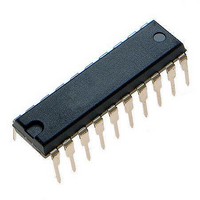ATTINY461V-10PU Atmel, ATTINY461V-10PU Datasheet - Page 180

ATTINY461V-10PU
Manufacturer Part Number
ATTINY461V-10PU
Description
Microcontrollers (MCU) 4kB Flash 0.256kB EEPROM 16 I/O Pins
Manufacturer
Atmel
Specifications of ATTINY461V-10PU
Processor Series
ATTINY4x
Core
AVR8
Data Bus Width
8 bit
Data Ram Size
256 B
Interface Type
2-Wire/SPI/USI
Maximum Clock Frequency
10 MHz
Number Of Programmable I/os
16
Number Of Timers
2
Operating Supply Voltage
2.7 V to 5.5 V
Maximum Operating Temperature
+ 85 C
Mounting Style
Through Hole
Minimum Operating Temperature
- 40 C
On-chip Adc
11-ch x 10-bit
Program Memory Type
Flash
Program Memory Size
4 KB
Package / Case
PDIP-20
Package
20PDIP
Device Core
AVR
Family Name
ATtiny
Maximum Speed
10 MHz
Ram Size
256 Byte
Operating Temperature
-40 to 85 °C
Lead Free Status / RoHS Status
Lead free / RoHS Compliant
Available stocks
Company
Part Number
Manufacturer
Quantity
Price
Company:
Part Number:
ATTINY461V-10PU
Manufacturer:
ATMEL
Quantity:
6 223
- Current page: 180 of 242
- Download datasheet (5Mb)
18.7.3
18.7.4
18.7.5
180
ATtiny261/461/861
Considerations for Efficient Programming
Chip Erase
Programming the Flash
The loaded command and address are retained in the device during programming. For efficient
programming, the following should be considered:
The Chip Erase will erase the Flash and EEPROM memories plus lock bits. The Lock bits are
not reset until the program memory has been completely erased. The Fuse bits are not
changed. A Chip Erase must be performed before the Flash and/or EEPROM are
reprogrammed.
Note:
The Flash is organized in pages, see
the program data is latched into a page buffer. This allows one page of program data to be pro-
grammed simultaneously. The following procedure describes how to program the entire Flash
memory (see
• The command needs only be loaded once when writing or reading multiple memory
• Skip writing the data value 0xFF, that is the contents of the entire EEPROM (unless the
• Address high byte needs only be loaded before programming or reading a new 256 word
1. Load Command “Chip Erase”:
1. Load Command “Write Flash”:
2. Load Address Low byte:
locations.
EESAVE Fuse is programmed) and Flash after a Chip Erase.
window in Flash or 256 byte EEPROM. This consideration also applies to Signature bytes
reading.
a. Set XA1, XA0 to “10”. This enables command loading.
b. Set BS1 to “0”.
c. Set DATA to “1000 0000”. This is the command for Chip Erase.
d. Give XTAL1 a positive pulse. This loads the command.
e. Give WR a negative pulse. This starts the Chip Erase. RDY/BSY goes low.
f.
a. Set XA1, XA0 to “10”. This enables command loading.
b. Set BS1 to “0”.
c. Set DATA to “0001 0000”. This is the command for Write Flash.
d. Give XTAL1 a positive pulse. This loads the command.
a. Set XA1, XA0 to “00”. This enables address loading.
b. Keep BS1 at “0”. This selects low address.
c. Set DATA = Address low byte (0x00 - 0xFF).
d. Give XTAL1 a positive pulse. This loads the address low byte.
The EEPROM memory is preserved during Chip Erase if the EESAVE Fuse is programmed.
Wait until RDY/BSY goes high before loading a new command.
Figure 18-5
for signal waveforms):
Table 18-7 on page
173. When programming the Flash,
2588E–AVR–08/10
Related parts for ATTINY461V-10PU
Image
Part Number
Description
Manufacturer
Datasheet
Request
R

Part Number:
Description:
Manufacturer:
Atmel Corporation
Datasheet:

Part Number:
Description:
Manufacturer:
Atmel Corporation
Datasheet:

Part Number:
Description:
IC AVR MCU 4K 20MHZ 32-QFN
Manufacturer:
Atmel
Datasheet:

Part Number:
Description:
IC MCU AVR 4K FLASH 20MHZ 20SOIC
Manufacturer:
Atmel
Datasheet:

Part Number:
Description:
MCU AVR 4K FLASH 15MHZ 32-QFN
Manufacturer:
Atmel
Datasheet:

Part Number:
Description:
MCU AVR 4KB FLASH 15MHZ 32-VQFN
Manufacturer:
Atmel
Datasheet:

Part Number:
Description:
MCU AVR 4KB FLASH 20MHZ 20SOIC
Manufacturer:
Atmel
Datasheet:

Part Number:
Description:
IC MCU AVR 4K 20MHZ 32QFN
Manufacturer:
Atmel
Datasheet:

Part Number:
Description:
Microcontrollers (MCU) 4kB Flash 0.256kB EEPROM 16 I/O Pins
Manufacturer:
Atmel
Datasheet:

Part Number:
Description:
IC, MCU, 8BIT, 2K FLASH, 20SOIC
Manufacturer:
Atmel
Datasheet:













